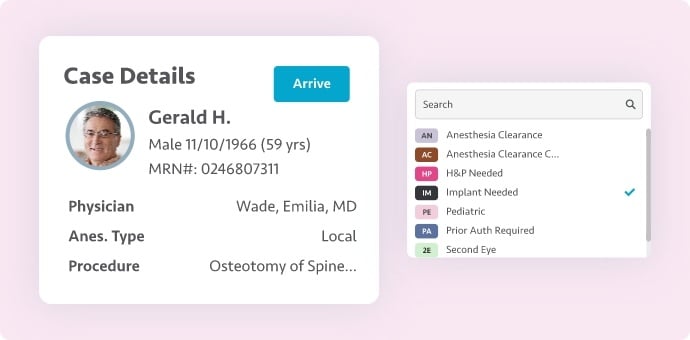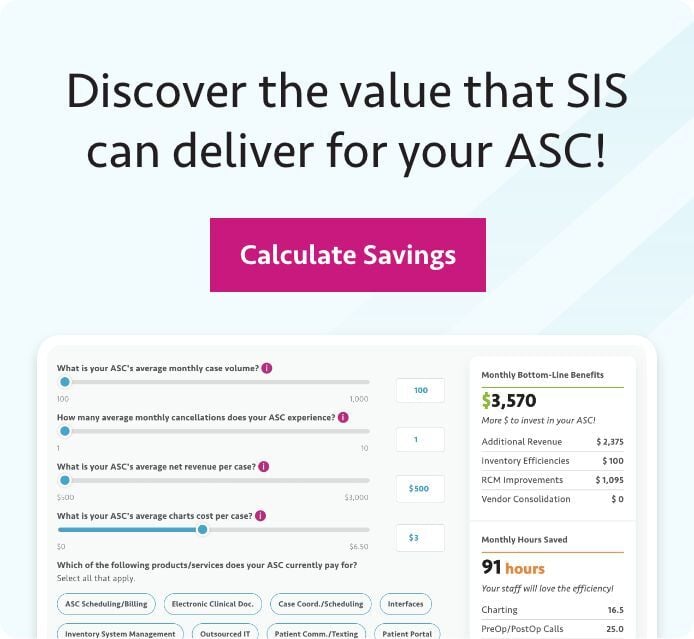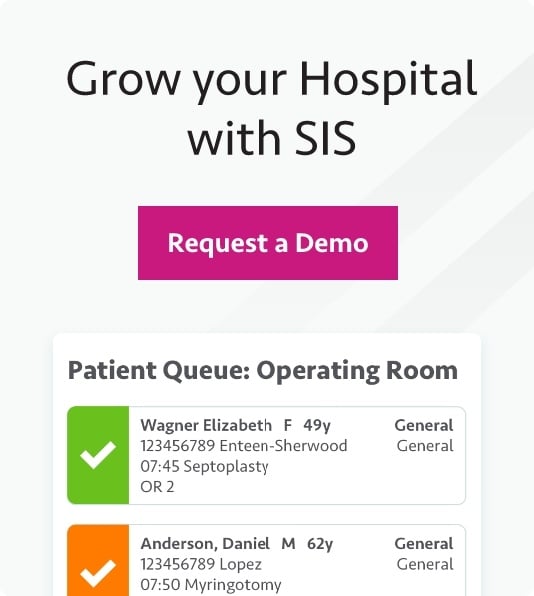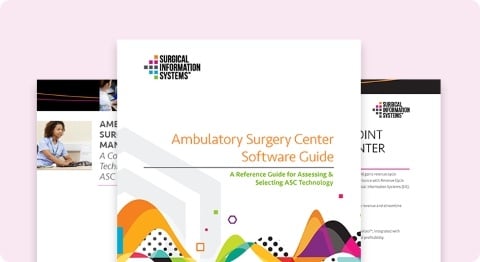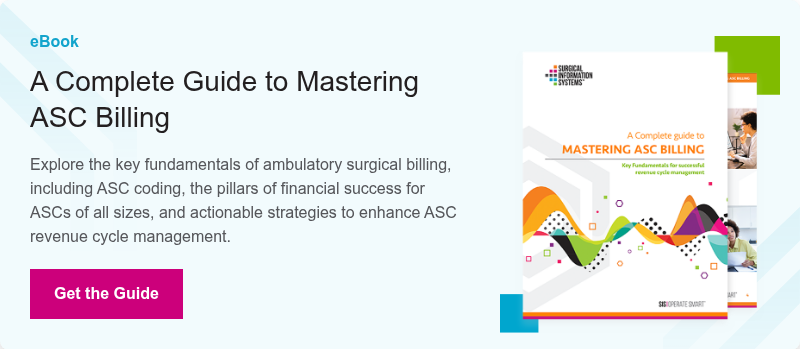Claim denials are a common but manageable challenge for ASCs. By understanding the root causes of denials, improving coding accuracy, streamlining documentation and appeals processes, and leveraging modern ASC technology, surgery centers can reduce their number of denials and further optimize revenue cycle performance.
Claim denials are an unavoidable reality in the operation of any ambulatory surgery center (ASC). The likes of complex payer requirements, coding nuances, and ever-changing rules and regulations make some denials inevitable despite an ASC's best efforts. However, it is possible to reduce the likelihood of denials and minimize their occurrence.
Let's explore some of the most common reasons why claim denials occur, how to improve ASC medical coding to help prevent future denials, and the importance of creating a streamlined appeals process to resolve denials as quickly as possible.
Causes of ASC Claim Denials
To reduce the risk of claim denials, ASCs must first understand why they occur. Here are some of the most common reasons.
ASC medical coding mistakes
ASC coding is complex, and rules can differ between payers. Services may be bundled together for one payer, while another may require individual line items to be claimed separately. Some care may not be covered due to recent regulation changes. One mistake violating the rules can result in a denial, which is why accuracy is paramount — something ASC coding and billing training should emphasize.
Prior authorization issues
Some payers require ASCs to gain authorization prior to surgery. If this step is missed, it can trigger a denial. Deviating from scheduled codes can also cause problems. Payers can be hesitant to approve preauthorized codes, so if an ASC does get one, it's essential to follow protocol and use it appropriately.
Lacking required information
Sometimes, documentation from surgeons is not as comprehensive as it needs to be, which can lead to a lack of specificity when coding. Failing to code to the highest level can result in denials. Omitting pertinent information can also get a claim flagged and rejected.
Incorrect patient identifier
Getting a detail about a patient wrong is enough to get a claim denied. Simple mistakes, like misspelling the patient's name or failing to verify and update insurance information, are not unusual. It's essential to ensure that all patient-identifying information is accurate down to the letter.
Missing filing deadlines
Since ASC medical coding is complicated and ASCs complete many procedures in a single day, it can be easy to miss filing deadlines, both for billing and appeals. As such, it's important that ASCs keep track of deadlines, especially if they differ between payers, and work to submit claims and appeals promptly — and always before any deadlines.
Other issues that may trigger claim denials include duplicating claims or services, bundling codes incorrectly, claiming charges that aren't covered, claiming care that's already been covered by another payer, expired eligibility, and claiming out-of-network services that are in-network.
How to Prevent Denials in Your ASC
Preventing denials largely hinges upon taking a proactive approach to ASC medical coding and billing. The more guidelines you have in place upfront to ensure every step required to create and submit a claim is completed accurately, the greater the likelihood of it being accepted and processed by the payer. Here are some tips to help your ASC improve its ability to avoid denials.
Ensure accurate ASC coding
Develop clear, up-to-date, and easily accessible ASC coding guidelines for each payer that speaks to important topics like proper use of modifiers, bundling/unbundling of procedures, appropriate procedure codes, and how and where to include information on forms. If using a pre-authorized code, update the authorization immediately when there's a change.
Verify insurance eligibility
Perform real-time insurance verification to confirm patient eligibility. When patients check in, ask for a copy of whatever documentation your ASC needs to verify eligibility, or make a phone call to the payer to confirm. Technology can also help you verify patient eligibility.
Improve documentation
Emphasize the importance of comprehensive, accurate documentation to your surgeons to help make sure all information needed for ASC coding and billing is captured clearly and accurately. Payers may request additional information if the claim lacks details, prolonging the process and, ultimately, the delivery of your payment.
Establish and adhere to clear deadlines
Claims need to be filed in a timely manner, and this is where streamlined workflows are of utmost importance. Each person needs to handle their part of the billing process efficiently, and they need to have all the information required to keep the claim moving forward. Appeals also must be addressed as soon as possible and routed to the person who is responsible for address the cause(s) of denials.
Build strong, communicative relationships with payers
When you establish a partnership with your commercial payers, you can gain more insight and context into how they like to do business, and working to meet those expectations can help everyone. As such, try to always understand their rules and comply with their guidelines, including timelines, how to submit claims, and appeals procedures. When appealing denials, take the time to write articulate arguments that showcase thoughtfulness and attention to details rather than a rushed response.
Conduct internal coding audits
You could be doing everything right and following all the best practices but find that something is still amiss with your revenue cycle that's leading to an increase in denials. In this case, an internal audit can help identify patterns in denials and inform how to catch errors before billing to avoid the same mistakes down the line. Audits can also help measure revenue cycle performance and identify opportunities for improvement, like delivering more ASC coding and billing training.
Analyze all denials
A good practice is to gather data on denials as they occur. This information can help you understand themes behind denials, determine root causes, and gather supporting evidence to use in appeals. Then, you can work to adjust internal workflows and processes and integrate learnings into ASC coding guidelines moving forward.
Conduct regular training for staff
ASC coding and billing training should focus on issues like payer-specific requirements and strategies for managing denials. When updates roll out to codes or contracts or new regulations are set to go into effect, set up new trainings and create new resources to share with staff to ensure everyone is up to date.
Upgrade to modern ASC technology systems
ASC management software can help cross-check codes, flag potential errors, automatically share relevant information with payer systems, better ensure claims are in compliance with rules and regulations, and track denials as well as appeals. Such tools — including those increasingly supported or powered by artificial intelligence (AI) — can also help with automatically verifying insurance coverage and eligibility, checking coding accuracy, scrubbing claims for potential issues of concern, and keeping an ASC's data organized for ease of access.
Following these best practices can have a measurable impact on ASC medical coding success and help reduce your denial risk.
Importance of Streamlining ASC Appeals
Even if your ASC is as proactive and accurate as possible, denials will still happen, so it's important to establish a streamlined appeals process. Having clear appeals policies and processes in place can help payers review and approve appeals quickly and keep collections coming in.
To improve your appeals process, start by reviewing all payer contracts for denial language. This will help you understand what's required when using certain codes and how to bill them appropriately. Keep specifics documented clearly and concisely, so staff can reference the rules at a glance.
Next, gather information on common denials and successful appeals and try to identify any patterns or trends in them. For example, is one specific procedure or code causing more denials than others? Is one surgeon or team member associated with an unusually high rate of denials? By finding common threads and determining root causes, you can better understand what needs to change to increase claim success.
Doing the above will equip you with the information you need to identify which claims are likely to trigger denials. Flag these claims and the related payer contracts to ensure staff know to pay extra attention to their ASC medical coding and communication in such instances. You can also encourage staff to use edits to catch prebilling errors before submitting a claim. This will help set up claims for success and simplify the appeals process when denials happen.
The next step is to develop an organized list of priorities and establish thresholds for appeals. Decide how much money is worth an appeal or multiple appeals, and then pick your battles carefully. Not every dollar amount is going to be worth the time and effort to chase down. If time is money, then the time your staff spends appealing a denial starts to have a diminishing return at a certain point. As such, consider establishing a process or guideline to elevate high-dollar denials and write-off low-dollar denials.
Finally, appeals require timely follow-up and clear communication. Track the appeal timeline from the moment a denial happens and encourage staff to respond as quickly as possible. Understanding how long the appeals process takes can help you understand how best to support staff and boost the speed of denial resolution.
Enhancing Success With ASC Technology and Expertise
The right technology and people can make all of the above easier. For example, a complete ASC solution can transform claims management by keeping all clinical documentation within the same system, improving documentation with digital charting, and automating ASC medical coding and billing functions.
Features like electronic insurance eligibility verification, advanced tracking and analytics that can report on denial cases, clearinghouse solutions that enable the seamless exchange of data between ASCs and payers, and notification systems that can send alerts when claims are denied or accepted can provide staff with the support and information needed to improve claims and reduce denials.
You can also choose to entrust your ASC’s coding or entire revenue cycle to external experts. Outsourced ASC Revenue Cycle Services are growing in popularity for their ability to boost financial performance, support growth, and ease the burden on in-house teams.
Paving the Way to Better ASC Medical Coding and Billing Performance
To summarize, ASC medical coding and billing is intricate, complex work, and mistakes are bound to happen. But by implementing clear ASC coding guidelines, delivering ASC coding and billing training for staff, and leveraging technology and services that can help maintain high levels of billing and coding accuracy, surgery centers can minimize claim denials and improve the speed and success of the appeals process. This will help ensure your ASC's revenue cycle runs smoothly and your ASC gets paid on time.
Looking for more coding guidance to flag and effectively fix errors? Check out this coding quirks webinar. For a deeper dive into optimizing your ASC's operations with technology, explore our comprehensive guide on ASC Management: A Comprehensive Technology Guide for ASC Administrators.




